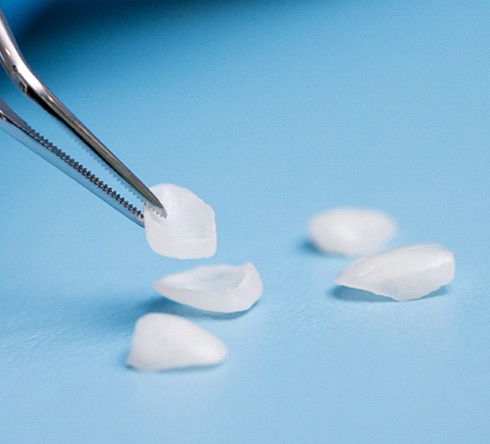After you’ve made sure that your mouth is healthy, Dr. Marable can offer
a number of services that can leave your smile looking brighter and more
attractive overall. Is there a small crack you want to hide? Are you
embarrassed by yellow teeth? Are there just too many flaws to know where to
start? Thanks to porcelain veneers, we have a way to seamlessly erase these
issues and leave a dazzling grin in its place.
Call our practice today
to set up an appointment to learn more.
What are Veneers?

A veneer is simply a thin cover for the front of your tooth. You can think
of it like a crown, except it only covers one side of the enamel instead of
the whole thing. By hiding the tooth entirely from view, we can make any
number of cosmetic flaws virtually disappear. Each veneer plan is
personalized based on the changes the patient wants to make. Sometimes only
a single veneer is needed; other times you need six or eight, and in still
other cases you’ll need enough to cover every visible tooth.
Who is a Good Candidate for Veneers?

Porcelain veneers are a good choice for making the following corrections:
- Closing small gaps between the teeth.
-
Hiding stains that you can’t get rid of with professional whitening.
-
Improving teeth that are misshapen or appear too short in the mouth.
-
Covering up minor chips and cracks that don’t put the structure of
the tooth in danger.
We generally recommend veneers over other cosmetic treatments if there are
numerous flaws that you want to address all at once. Before beginning the
procedure, we’ll have to make sure that your teeth have enough enamel
to support the veneers.
The Procedure

First of all, small amounts of enamel have to be shaved off of the tooth in
order to make room for the veneer. Then we can take impressions of the tooth
and send them to a dental lab, where they can carefully customize your
restorations so that they’ll blend in with your other teeth once in
place. Until your veneers are ready, you’ll wear temporary
restorations to protect your teeth and keep your smile looking nice. The
permanent veneers are placed on the teeth during your second visit after
last-minute adjustments have been made.
Taking Care of Veneers
For the first few days of wearing veneers, your teeth may be more sensitive
than normal, but this will fade over time. Try to avoid hot or cold foods as
much as possible during this period. After that, you can take care of your
veneers by continuing to brush and floss like you would your natural teeth.
Do not chew on anything hard like ice, as that can very easily damage your
veneers. We can check on the status of your veneers during regular checkups.
Veneers FAQs
Are Veneers Permanent?
While veneers cannot be called permanent since they will eventually need to be replaced, the process of placing them is irreversible. This is because preparing the teeth to receive them requires the removal of a small amount of enamel that will not grow back, and teeth that have received veneers will need to wear them for life for protection against injury and infection.
What Happens to the Teeth Under Veneers?
Receiving veneers will not harm your teeth since it involves the removal of only a small amount of enamel and the bonding material used to place them is completely safe for use in the human mouth. Since the veneers will serve to protect the treated teeth from injury and infection, they will not increase your risk of tooth decay. However, you will still need to brush and floss daily to prevent dental infections that can compromise the bond between the veneers and your teeth. It’s also best to limit your sugar consumption, refrain from using your teeth to open packaging, and attend regular dental cleanings at our Fort Valley office.
Do Veneers Give You a Lisp?
Since veneers slightly change the dimensions of the treated teeth, they can alter the way in which vibrating air moves through the mouth during speech. This can lead to some patients developing a temporary lisp since their tongues and lips may not be able to coordinate properly when they first receive their veneers. This problem will go away on its own as you get more practice speaking with your veneers, but you may be able to accelerate this adjustment process by singing a song or reading a favorite book out loud while repeating any difficult words until you get the hang of them. In some cases, Dr. Marable can help reduce a lisp by making small adjustments to the patient’s veneers in our Fort Valley office.
Can You Whiten Veneers?
Teeth whitening treatments are designed to lift stains from natural enamel and are not effective at removing discoloration from veneers. This means that receiving teeth whitening after getting veneers can leave a patient with an unevenly whitened smile since the cosmetic devices will not be affected by the treatment. If you’re interested in receiving both teeth whitening and veneers, it is probably best to address your dental stains first so your veneers can be matched to your smile’s new brighter shade.
Do Veneers Feel Like Real Teeth?
Most patients who receive veneers report that these devices feel completely natural and they don’t typically notice them when eating or speaking. This is because porcelain is remarkably similar to natural enamel in texture and veneers are carefully designed based on detailed measurements taken of your mouth. Veneers are smooth enough to be gentle on your soft oral tissues, and the reshaping of your teeth to prepare them for these devices will keep them from protruding uncomfortably.





